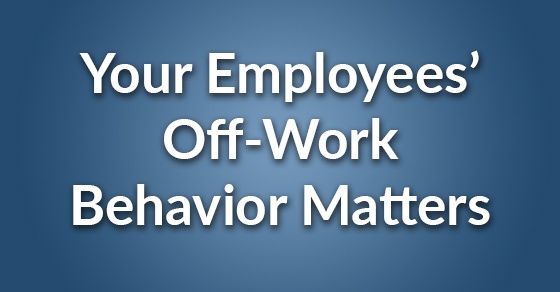
When employees are off the clock, how they choose to spend their time is up to them. However, that doesn’t mean an employer is immune to a staffer’s off-work behavior. Your organization (or personal reputation) can be severely harmed by an employee’s actions — even when he or she isn’t on the job.
Now, whether you should take an adverse employment action (such as suspension or termination) against an employee for an outside-of-work incident is a delicate matter. A variety of laws can affect what action you can take, so you should consult an attorney before acting.
3 Sources of Concern
What your employees are doing when not at work generally can be a matter of legitimate concern and possibly warrant action when:
- There can be a relationship between that behavior and the employee’s job performance (or the job performance of other employees). In fact, in this type of situation you could put yourself at liability risk if you don’t act, because of the potential negative impact on the rest of your staff and/or family if the employee is a household one. One clear-cut example is when an employee who drives other employees or customers (or family members) in the normal course of his or her job is convicted of driving while intoxicated.
- The behavior or action can damage your personal/organization’s reputation. The extent of the damage will likely vary according to the stature of the individual. A newly hired, entry-level employee’s notorious (but not necessarily criminal) after-hours actions would probably cause less reputational harm than those of a high-level executive. If you do decide to discipline or terminate an employee for unbecoming behavior, you’ll need to be able to show the harm caused — perhaps you’ve lost customers or have had other key employees quit.
- The action can hurt your business concretely in some other way. The most common examples here are an employee moonlighting for a competitor or freelancing for members of your organization’s customer base. In general, you’re within your rights to establish and enforce a policy barring employees from working for or as competitors on the side.
Another common issue in this day and age is employees running blogs or social media accounts criticizing their employers. Freedom of expression laws come into play here, so you’ve got to step carefully.
Clear Communication
No employer can monitor or control their employees’ every waking move — nor should they. Recognizing your risks in this area is important though. Also important is clearly communicating employment policies regarding behavior outside of work.